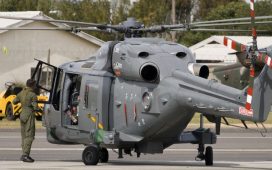Worrell Yeung Expands its Vision in Upstate NY with Ridge Barn
Worrell Yeung completes the steel-wrapped Ridge Barn as part of a remote residential compound that includes the Ridge House (see designboom’s coverage here) in Upstate New York. The two structures occupy the same elevated site with sweeping views of the Taconic and Catskill Mountains, and together they exemplify the studio’s precise and poetic approach to building in dialogue with the land. While Ridge House established a sculptural anchor, Ridge Barn introduces a more utilitarian structure — part guesthouse, part storage facility, part pool pavilion — that extends and deepens the architectural narrative.
Worrell Yeung rethinks the connection between buildings through a landscape intervention co-designed with Understory Landscape Architecture‘s Jeffrey Longhenry. Leaving Ridge House, visitors descend to the barn via a ‘trench walk,’ a carefully composed path carved into the hillside and inspired by land art pioneers like Andy Goldsworthy and Michael Heizer. Rather than a traditional walkway, this trench is a sculpted gesture in stone, one that brings movement and topography into active conversation.

images © Rafael Gamo
an embedded structure References Local Typologies
The architects at Worrell Yeung conceived Ridge Barn as a contemporary take on the ‘bank barn,’ a typology common in the region, traditionally embedded in the landscape for multi-level access. Tucked into a slope and clad in weathering Corten steel, Ridge Barn appears both purposeful and ancient, like a rusted monolith emerging from the hillside. Its lower level serves pragmatic needs — parking, a wine cellar, a bike workshop — while its position and materiality allow it to nestle almost invisibly into the terrain.
The barn’s upper level generously frames the landscape. An open-air breezeway bisects the plan, offering a dramatic 8-by-8-foot aperture that looks directly toward the Taconic Mountains. To one side lies a minimalist fitness space; to the other, a guest bunkhouse with an open living plan. Designed for comfort and retreat, the bunkhouse includes a compact kitchen, living, and sleeping area, topped by a loft accessible by a custom ladder. Two sculptural Lambert & Fils light fixtures, designed by Worrell Yeung, add a tactile counterpoint to the raw, industrial envelope.

Ridge Barn joins the neighboring Ridge House on-site in Upstate New York
Material Honesty and Weathering is celebrated
Worrell Yeung ensured that its Ridge Barn didn’t just function as a guest quarters or workshop. It also acts as a discreet pool house. The lower level includes a shower, water closet, and changing area for swimmers. The pool itself sits just downslope, reached via stone pavers that continue the landscape’s stepped geometry. Two sides of the pool meet the ground plane, while the other two, clad in Corten steel, emerge as the land drops away, echoing the material and language of the barn and appearing as if set within a sculpted cut of the hillside.
A consistent ethos of elemental materiality is applied across the site. While Ridge House is clad in corrugated metal with board-formed concrete ends, Ridge Barn’s Corten shell continues the theme of structures designed to age and mark the passage of time. The choice of untreated, industrial materials isn’t austere — it’s intentional, allowing the architecture to record weather, light, and seasonal shifts. Each component becomes an evolving part of the landscape’s palette, a physical memory of environment over time.

a landscape pathway is inspired by land artists like Andy Goldsworthy and Michael Heizer
Worrell Yeung worked closely with the client from the earliest stages to establish a shared language rooted in art and ecology. ‘Landscape as art, architecture elevating the experience of nature, making visible the mark of human intervention,’ is how Max Worrell describes the studio’s goal. Ridge Barn, like Ridge House before it, draws on references that range from modern land artists to vernacular farm buildings, to the quiet poetry of forest floor compositions. It’s a place where material meets metaphor, and structure becomes site.

mountain views are framed through an upper-level breezeway

Corten steel cladding visually and materially links the barn to the surrounding landscape












